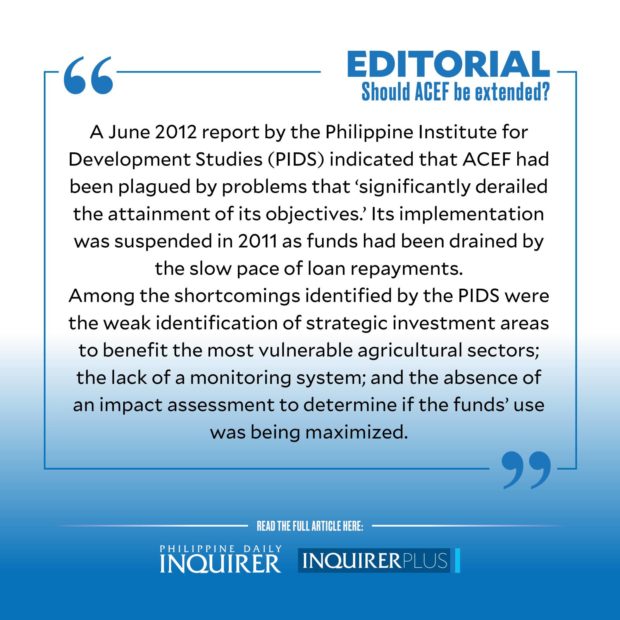Should ACEF be extended?
The requiem for ACEF, or the Agricultural Competitiveness Enhancement Fund, was supposed to have been sounded as early as 2005, when the country’s vital but impoverished agriculture sector was supposed to have been modernized with the help of tariff collected on imported farm products such as onions, potatoes, garlic, coffee, and tobacco.
ACEF was enacted into law in 1996 as part of the Agricultural Tariffication Act, which lifted import bans on a number of major agricultural commodities when the Philippines joined the World Trade Organization. Now, 17 years after its supposed demise, there are moves in Congress to extend its life on the depressing reason that it has yet to fulfill its original objective to make the agriculture sector more competitive against imports.
The fund was established to provide a safety net for farmers and fishermen who would be hit hard by the government’s trade liberalization policies, with the money earmarked for vital infrastructure such as irrigation, farm-to-market roads, postharvest facilities, as well as credit, research and development, extension services, and training.
Quezon Rep. Wilfrido Mark Enverga, chair of the House committee on agriculture and food, said it was “imperative” to extend ACEF until 2028 since its primary purpose, to make the agri sector more productive and competitive in the world market, “remains valid and relevant in the challenging years ahead.”
A law was needed to fulfill this objective, said Enverga, whose House Bill No. 2385 has already been approved on second reading. Should the bill pass, it would be the third extension for ACEF: it was first extended to 2015, then again to 2022, and possibly, to 2028.
“We need all the help we can get and all the resources we can tap to intensify the preparedness of Philippine agriculture,” said Enverga, who noted the increasing competition posed by neighboring countries in the Association of Southeast Asian Nations.
But not everyone is thrilled about the proposed extension of the fund, citing grave concerns about corruption and mishandling since it was put into action in 2000. Government estimates on tariff collected for ACEF from 2000 to March 2022 reached P20.07 billion, but not every peso had been accounted for.
In fact, the bill seeking to extend its life calls for the submission of documents that should have been in place, such as the duties collected from 2016 to 2022, how much was given ACEF, and how much to the Department of Agriculture (DA) according to Department of Budget and Management papers.
Indeed, a June 2012 report by the Philippine Institute for Development Studies (PIDS) indicated that ACEF had been plagued by problems that “significantly derailed the attainment of its objectives.” Its implementation was suspended in 2011 as funds had been drained by the slow pace of loan repayments.
Among the shortcomings identified by the PIDS were the weak identification of strategic investment areas to benefit the most vulnerable agricultural sectors; the lack of a monitoring system; and the absence of an impact assessment to determine if the funds’ use was being maximized.
The PIDS study noted, for instance, that the repayment rate of loans from 2004 to 2009 ranged from just 7 percent to 38 percent.
Former senator Francis Pangilinan also cited a damaging report from the DA showing how a mere P200 million in loan repayments since 2002 had been accounted for, with some P900 million that was supposed to be released to farmers and fishermen still unliquidated.
Perhaps the most damaging assessment came from the Commission on Audit, which said in 2010 that as of 2009, a “substantial portion” of the ACEF funds was not being used as intended. While only a small portion of the loans were being repaid, additional loans were being granted beneficiaries who still had to pay previous loans. Loans were also being given without interest and collateral.
In 2016, Anakpawis Rep. Fernando Hicap opposed the extension of ACEF, citing “testimonies of corrupt practices.” Out of 216 projects that acquired ACEF loans amounting to more than P4.5 billion, 99 projects still had unpaid loans amounting to more than P2.5 billion.
In the latest House hearings, Batangas Rep. Gerville Luistro noted that “If anyone [was] benefiting from [ACEF], it appears to be the traders and importers. It’s like we are giving them permission or license to go for more imports.”
Enverga, however, sought to downplay these concerns and said that the current program for ACEF, which has a remaining balance of P4.4 billion as of August 2022, “has somewhat been debugged of its corruptive and corrosive practices,” and that “stringent safeguards” have been put in place.
But where is the proof of that? As it is, further extending the ACEF can only be justified after an extensive review of how its fund was used, with those behind its lackluster implementation held accountable.
As the PIDS concluded as early as 2012, “Without meaningful reforms, ACEF may just go down as one of the greatest national program failures in recent memory.”





















